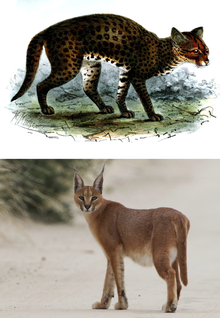Caracal (genus)
Appearance
| Caracal | |
|---|---|

| |
| African golden cat (C. aurata) Caracal (C. caracal) | |
| Scientific classification | |
| Domain: | Eukaryota |
| Kingdom: | Animalia |
| Phylum: | Chordata |
| Class: | Mammalia |
| Order: | Carnivora |
| Suborder: | Feliformia |
| Family: | Felidae |
| Subfamily: | Felinae |
| Genus: | Caracal Gray, 1843 |
| Type species | |
| Caracal melanotis Gray, 1843
| |
| Species | |
|
See text | |
Caracal is a genus in the subfamily Felinae of the family Felidae. It was proposed by John Edward Gray in 1843 who described a skin from the Cape of Good Hope in the collection of the Natural History Museum, London.[1] Historically, it was considered to be a monotypic genus, consisting of only the type species: the caracal C. caracal.[2]
Taxonomy
[edit]Phylogenetic analysis revealed that caracal, African golden cat (C. aurata) and serval (Leptailurus serval) are genetically closely related forming a genetic lineage that diverged from the common ancestor of the Felidae 7.91 to 4.14 million years ago.[3] This taxonomic classification is used in the IUCN Red List for the African golden cat.[4] It is used as a synonym for the serval.[5]
| Common name | Scientific name and subspecies | Range | Size and ecology | IUCN status and estimated population |
|---|---|---|---|---|
| Caracal | Caracal caracal (Schreber, 1776) |

|
Size: Habitat: Diet: |
NT
|
| African golden cat | Caracal aurata (Temminck, 1823) Two subspecies
|

|
Size: Habitat: Diet: |
VU
|
References
[edit]- ^ Gray, J. E. (1843). "The Caracal". List of the specimens of Mammalia in the collection of the British Museum. London: The Trustees of the British Museum. p. 46.
- ^ Wozencraft, W. C. (2005). "Genus Carcal". In Wilson, D. E.; Reeder, D. M. (eds.). Mammal Species of the World: A Taxonomic and Geographic Reference (3rd ed.). Johns Hopkins University Press. p. 533. ISBN 978-0-8018-8221-0. OCLC 62265494.
- ^ Johnson, W. E.; Eizirik, E.; Pecon-Slattery, J.; Murphy, W.J.; Antunes, A.; Teeling, E.; O'Brien, S.J. (2006). "The Late Miocene Radiation of Modern Felidae: A Genetic Assessment". Science. 311 (5757): 73–7. Bibcode:2006Sci...311...73J. doi:10.1126/science.1122277. PMID 16400146. S2CID 41672825.
- ^ a b Bahaa-el-din, L.; Mills, D.; Hunter, L. & Henschel, P. (2015). "Caracal aurata". IUCN Red List of Threatened Species. 2015: e.T18306A50663128.
- ^ Thiel, C. (2015). "Leptailurus serval". IUCN Red List of Threatened Species. 2015: e.T11638A50654625. Retrieved 29 October 2018.
- ^ Fischer, J. B. (1829). "F. caracal Schreb.". Synopsis Mammalium. Stuttgart: J. G. Cottae. p. 210.
- ^ Avgan, B.; Henschel, P. & Ghoddousi, A. (2016) [errata version of 2016 assessment]. "Caracal caracal". IUCN Red List of Threatened Species. 2016: e.T3847A102424310. doi:10.2305/IUCN.UK.2016-2.RLTS.T3847A50650230.en. Retrieved 15 January 2022.
External links
[edit]


